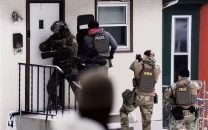Biden notifies Congress of US Ballistic Missile Defense deployment to Israel
Biden outlines US military’s adjusted posture to strikes including deployment of advanced THAAD defence systems

President Joe Biden has informed Congress of the deployment of a US ballistic missile defense system to Israel, signaling a significant military response to rising tensions with Iran.
This move comes in light of Iran’s retaliatory ballistic missile strike on Israel earlier this month, which escalated the ongoing conflict between the two nations.
In a formal letter to House Speaker Mike Johnson, Senate Majority Leader Chuck Schumer, and other congressional leaders, Biden emphasized the United States' unwavering commitment to Israel’s security.
The president outlined the US military’s adjusted posture in response to the strikes and detailed the deployment of advanced defense systems, including the Terminal High-Altitude Area Defense (THAAD) system.
Biden explained that US forces are positioned in the region to protect American interests and citizens, and to support Israel's defense against further missile attacks.
He also mentioned the deployment of the USS Abraham Lincoln Carrier Strike Group, additional destroyers, fighter squadrons, and the guided-missile submarine USS Georgia, all to bolster defensive measures.
The THAAD system’s arrival in Israel on Monday was confirmed by the Pentagon.
US troops are already on the ground to operate the system, which is designed to intercept and neutralize ballistic missile threats.
Biden’s letter highlighted that US forces will remain in the region as long as this heightened defense posture is necessary against Iran.
The escalation began due to the July assassination of a former Hamas leader in Tehran and the death of Hezbollah Secretary-General Hassan Nasrallah in Beirut by Israel.
In reaction, Iran lauched 200 missiles targeting various locations across Israel, causing significant damage.
Prime Minister Benjamin Netanyahu assured Biden that any attacks would focus strictly on military infrastructure, rather than sensitive nuclear or oil facilities.
Biden's letter also referenced the US and Israeli joint success in downing dozens of Iranian missiles before they could inflict civilian harm, marking it as a "historic defense" operation.
However, with tensions still high, Netanyahu’s government remains committed to responding to Iran’s aggression, even as it seeks to avoid further escalation.
While Israel’s military response is being carefully calibrated, clashes in other areas have continued.
Israeli forces have intensified attacks against Hezbollah in southern Lebanon, while renewed attacks on Hamas targets in northern Gaza have drawn warnings from humanitarian groups about civilian risks.
The deployment of the THAAD system represents a strategic effort by the US to reinforce Israel’s defenses without provoking a broader conflict.
Biden has also been urging restraint in targeting sensitive Iranian sites, warning that any actions disrupting global oil markets could have far-reaching consequences, especially with the upcoming US presidential election.
This latest step underscores Washington’s commitment to Israel’s security however this risks the potential for broader destabilization in the Middle East.



















COMMENTS
Comments are moderated and generally will be posted if they are on-topic and not abusive.
For more information, please see our Comments FAQ